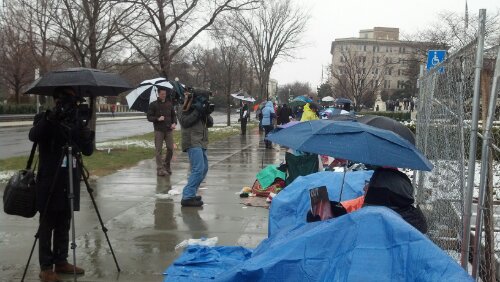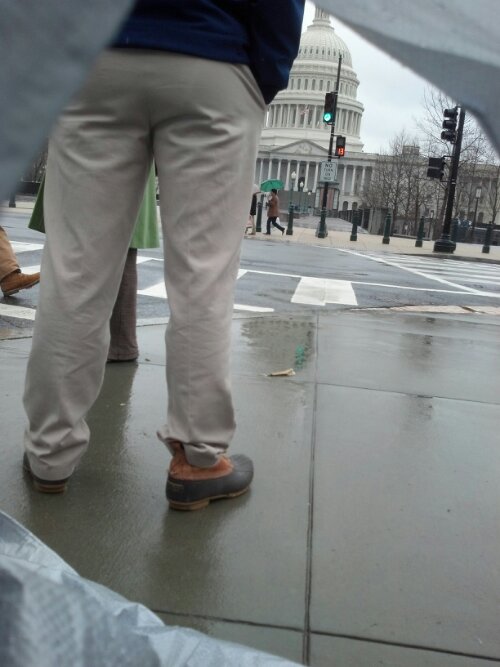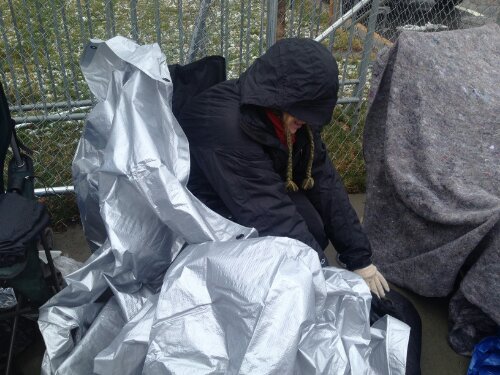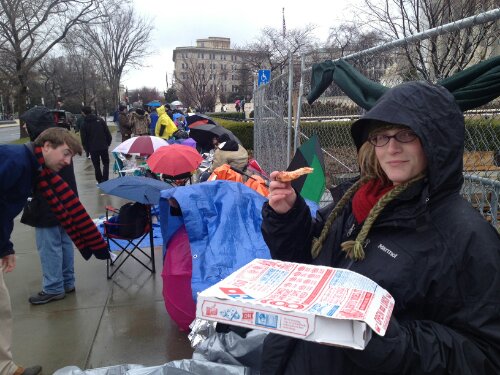
What followed for me was an obsession. An obsession with law, an obsession with the Prop 8 case, and an obsession with the intricacies of the Supreme Court. That obsession led to my writing being published somewhere outside my blog for the first time, it led to me spending the night outside the Supreme Court to hear the Prop 8 arguments, and it led me to today — sitting home alone, watching SCOTUSblog live-blogging the legalization of marriage nationwide and sobbing so hard my Fitbit thinks I’m jogging.
I knew gay marriage across the US was coming, but I am still an emotional wreck, experiencing a full rainbow flag of conflicting emotions.
I am, of course, ecstatic and relieved. It’s as though a huge weight has been lifted, but it’s also like that weight was holding the blood in from a lot of old wounds. That night in 2008, that day almost exactly 2 years ago when California got marriage but the justices would not deliver it to the rest of the country, the passing of dozens of state constitutional amendments defining marriage as between a man and women, my mother’s best friend who died of AIDS twenty years ago, the struggle of so many of my friends in coming out or being dragged out in a hostile culture, and on, and on.
And I am exhausted because this was a drop in the bucket of injustices in the world and it took so much energy from so many people to manage this change.
There are other battles, other fronts, other wars waging. Marriage was a fight for inclusion in a conservative institution — for LGBT (although, let’s be real, it’s mostly G here) people to become more accepted by mainstream society and have access to institutions of that society. Radicals are right to worry that we are buying into broken institutions with deep flaws, not just marriage, but the entire idea of a mainstream, conservative respectability. I disagree with radicals that the way to do this is entirely from outside, we need outsiders AND insiders, but the worry is that if queers get acceptance they will no longer be interested in changing the problematic social institutions in the world — prison, gun violence, homelessness, climate change, the war on drugs, the war on terror, racism, sexism, and a host of other problems that exist in the world. The worry is that the fight for marriage will have fully drained them of resources, and we’ve seen organizations lose funding while the focus was on marriage.
It’s like the flag at the SC State House, flying today during the funeral of Senator Reverend Clementa Pinckney. Yes, it must come down. Yes, it’s horrifying that that is even under discussion. Yes, it is a symbol of racism and hatred. But removing the flag won’t fix the problem, it’s not enough. That flag didn’t go to Dylann Roof’s house and point him the way to the Conservative Council of Citizens or Stormfront. Taking down the flag is necessary but it is also a band-aid over a gaping wound we can’t heal with hiding flags, and we’re focusing on it because it’s the only thing politicians can get done to address the social issues brought up by this act of racial terrorism.
It takes obvious, in-your-face, undeniable injustice to get action, and too often the action is the easy action. We aren’t dealing with racial inequality or access to guns or the reality that white men are our homegrown terrorists, we’re taking flags down. Gay marriage was the easy thing to fix, which is hard to believe considering how much time and money and energy and heartbreak went into the thing, but that’s true of that flag too. And gay marriage matters, it matters so much, if for no other reason than it offers same-sex couples a place from which to fight for other issues, but Loving v Virginia didn’t end racism or even create full mainstream acceptance of interracial marriage.
And so today I cry. I weep with joy and relief for a victory that was hard-fought and well-deserved. I weep for the people who didn’t make it to today, for the millions who died in the AIDS crisis, and for those who simply were born too soon to see this justice. And I weep because there’s still so much to do, more than can ever be done in my lifetime, more than can ever be done by my exhausted hands. I weep for the future person who will be crying like I am because you and I didn’t make it to see justice done.
But I also celebrate because today is a good day, a day in which massive good was done in this world, and that’s not nothing.
—
ETA: For similar commentary with a little bit of a different perspective and details, see Greta Christina’s post.
If you like what I’m doing, please consider supporting me at Patreon so that I can keep doing it.














